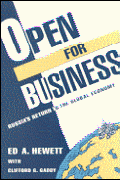In December 1991 the Union of Soviet Socialist Republics—born in violent revolution and dominated for more than six decades by highly authoritarian rule—was dissolved by its constituent republics. The causes for this remarkable event will be probed for many years to come. Our understanding of it may never be complete. Nevertheless, it is evident even now that part of the story lay in a conscious redirection of policy by specific individuals. Those at the center of political and economic power understood the flaws in their system well enough to initiate a process of reform, but one that triggered a more massive transformation than they had intended.
The process has left enormous turmoil in this wake. Political power has dissipated in all the new states emerging from the fragmented former USSR, and all are struggling to establish some constitutional order. They do so under conditions of severe austerity as they seed to reconstruct their once integrated, highly concentrated, internationally isolated economy into independent instruments of national viability. With no detailed blueprint available, and with only fractured mechanisms of policy control at their disposal, these new nations are being carried along by the inertia of state enterprises and by a spontaneous process or regeneration at the grass-roots level.
This book, which analyzes Gorbachev’s foreign economic strategy, provides a window for understanding the disintegrative forces that stymied his reforms and eventually defeated him, undermining the country he sought to preserve. Gorbachev was committed to ending Soviet isolation from the world economy and at the same time saving Soviet socialism. Ironically, it is the destruction of Soviet socialism and the emergence of new post-Soviet states, that has begun to break down the isolationist barriers erected over the last seven decades. This book documents the incredibly complex legacies that Russia and the other new post-Soviet states face as they see to integrate themselves into the global economy.
Authors
With

Ed A. Hewett, founding editor of Soviet Economy and formerly a senior fellow at Brookings, is now Special Assistant to the President on National Security Affairs and Senior Director of Soviet Affairs at the National Security Council.
